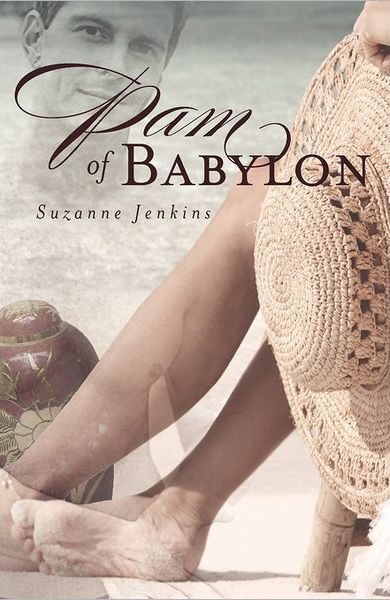 In author Suzanne Jenkins’ first novel, Pam of Babylon, fictional Pam Smith has led a charmed life. She has a beautiful home by the water in tony Babylon, New York. A homemaker, her children have grown and left home, but fifty-something Pam is content in her long marriage to Jack, a successful businessman. Following Jack’s sudden death, however, Pam leans that her husband’s life was not what it seemed. A series of revelations force Pam to deal with loss and disappointment as she discovers that her husband was markedly different than he appeared. Betrayals far worse than any Pam could have imagined force her to retreat to her meticulous beach house to process what she has learned and embrace her future. But first she must learn to forgive.
In author Suzanne Jenkins’ first novel, Pam of Babylon, fictional Pam Smith has led a charmed life. She has a beautiful home by the water in tony Babylon, New York. A homemaker, her children have grown and left home, but fifty-something Pam is content in her long marriage to Jack, a successful businessman. Following Jack’s sudden death, however, Pam leans that her husband’s life was not what it seemed. A series of revelations force Pam to deal with loss and disappointment as she discovers that her husband was markedly different than he appeared. Betrayals far worse than any Pam could have imagined force her to retreat to her meticulous beach house to process what she has learned and embrace her future. But first she must learn to forgive.
I’m delighted to welcome Suzanne to Colloquium for the first time today.
This Makes Me Uncomfortable
As I began writing in earnest two years ago, the inspiration to tell a story about an older woman who discovered her beloved husband’s infidelity after he died came from out of nowhere. Pam of Babylon simply appeared in my consciousness and I wrote it as I thought of it. Later, a quote by E.L. Doctorow would confirm my writing style was not unusual. He said, “Writing is like driving a car in the dark. You only see as far as the headlights go, but you can make the whole trip that way.” Those words validated me. An encounter with an editor who did not like my story line made me doubt the wisdom of spending another second writing. She asked me to do an outline before I began to write, which I found nearly impossible to do because of the way the book was coming to me as I went along. She referred to the story as triple-x rated because it contained a depiction of child abuse. Child abuse transcends the rating system.
Later, I learned from a fellow author that sometimes a writer/editor relationship may not be a good fit and it is acceptable to move elsewhere. Once I found the courage to move on, I found a new editor. She was a barracuda who demanded revisions and rewrites, but she also loved the story and wanted it to be the best I could make it. I felt totally comfortable deferring to all of her suggestions and to this day wish I had used her from the onset. However, once the story was published, I would encounter readers who felt the same way my former editor did. My books are not for everyone. I can’t say I enjoy writing about topics that many people find repugnant and some that are downright disgusting like the child abuse and marital infidelity. But it’s something that I find compelling for whatever reason and the stories wind through the tragedy and horror that normal people sometimes encounter.
After a book is finished, I suffer from insomnia for months. I’m in that mode right now. The Greeks of Beaubien Street will be released this summer, and although I love the story, there is a portion of the book that worries me because it depicts the seamier side of life in a most grotesque way. Even the perpetrator is disgusted with the crime. I know there will be those readers who are offended by it in spite of a warning. I almost didn’t write the book until my son, a filmmaker and writer, told me not to censor myself. I have tried censoring in the past and once I began, I found I was putting up so many parameters I could no longer write. The question I had to ask myself over and over confirmed that the story line was important. What is my purpose in writing about this topic? It isn’t to titillate, or to be sensational. In The Greeks, the horror story is in contrast to the gentle Greek father who prepares his homicide detective daughter’s breakfast every morning.
Regarding Pam of Babylon’s adult content, I tried to write so that it would be the least offensive as possible. If a writer is going to have child abuse as a topic, there is little that can be done to clean it up. It’s deplorable, and the consequences are usually tragic. The Kirkus Review said about the third book in the series, Dream Lover: “A gritty, realistic portrait of the aftermath of deceit.” In order for the resolutions to take place, I must first describe the conflict.
My friend Dan Georgakas, author of My Detroit, Growing up Greek and American in Motor City wrote when I confided my concerns, “.. . people are embarrassed by this [content] and want to project a perfect family image: a stereotype no one is going to believe anyway. I have always believed in showing warts whenever possible.” Some of character’s warts are painful to look at, but exist in real life.
The final book in the series may be finished this fall and has some of the characters achieving positive resolutions. Fans of Pam will be relieved that she is triumphant in the end.
Meet Suzanne

Suzanne’s latest books are Pam of Babylon, Don’t You Forget About Me, and Dream Lover.
Connect with Suzanne at her website, blog, or on Facebook or Twitter.



Comments are closed.